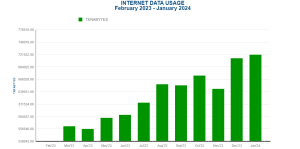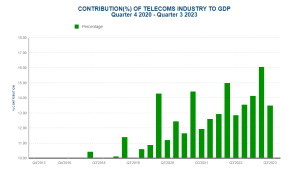The Nigerian Communications Commission (NCC) recently reported, Nigeria experienced a remarkable surge in data consumption, reaching a record high of 721,522 terabytes in January 2024. This notable milestone marks the highest monthly data usage recorded since the NCC began reporting such statistics, indicating a significant shift in the country’s digital landscape.
The surge in data consumption is particularly striking when compared to December 2023 figures, which saw a substantial increase during the festive period, totaling 713,200 terabytes. Despite the slight decline in internet users by 1.9 million from December 2023 to January 2024, the demand for data services soared, underscoring the evolving preferences of Nigerian consumers.

According to the NCC’s findings, the primary driving force behind this surge is the escalating adoption of 4G and 5G connections across the country. These advanced technologies offer faster internet speeds, prompting users to consume more data. While 2G connections remain prevalent, 4G subscriptions witnessed a steady rise, climbing from 31.33% in December 2023 to 31.75% in January 2024. Furthermore, the deployment of 5G technology, despite facing challenges such as device compatibility and infrastructure expansion, saw an increase in subscriptions, accounting for 1.11% of all connections in January 2024.
Telecom operators in Nigeria are intensifying their efforts to meet the growing demand for data services. Despite initial challenges, such as forex scarcity and infrastructure constraints, companies like MTN, Airtel, and Mafab Communications are investing resources to enhance their data offerings. MTN, which launched Nigeria’s first 5G network in September 2022, has expanded its services to seven cities and continues to roll out across the nation. Airtel, following suit with its 5G launch in June 2023, has plans for further expansion, aiming to reach more states within the next year. Mafab Communications, though facing delays in its 5G rollout, has initiated services in Abuja and intends to expand to six cities as per its licensing obligations.

The unprecedented surge in data consumption reflects Nigeria’s rapid digital transformation and the increasing reliance on advanced connectivity technologies. As telecom operators continue to invest in infrastructure and innovate their services, the trajectory of Nigeria’s digital landscape is poised for further growth and development.
Credit: Nairametrics (Text Excluding Headline)






















